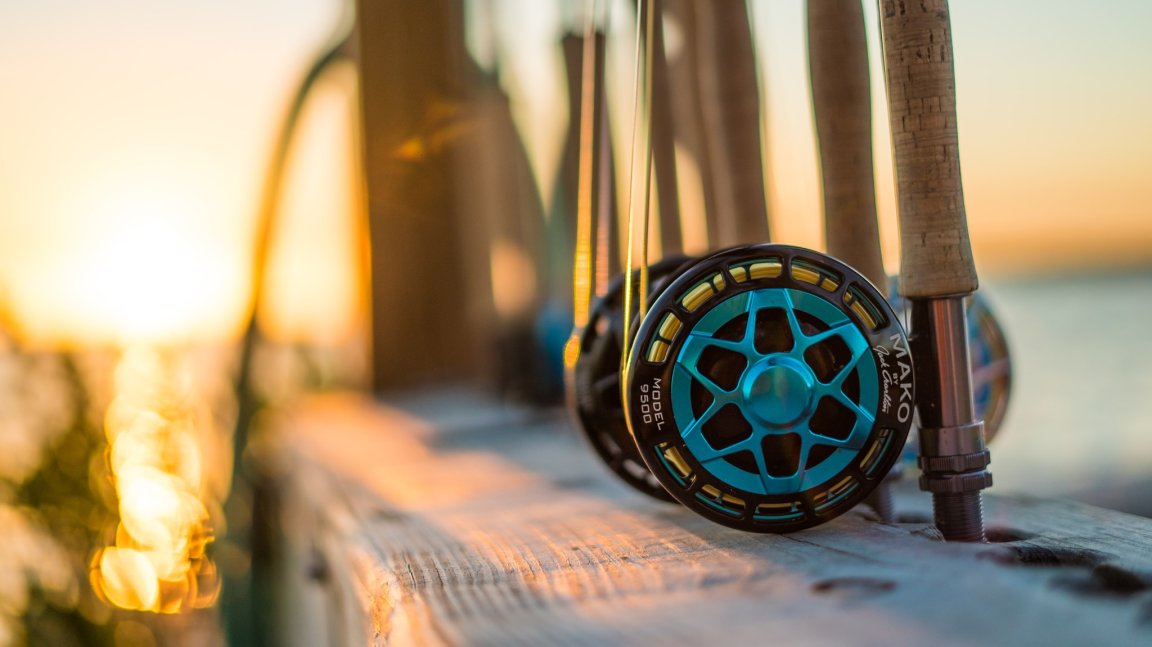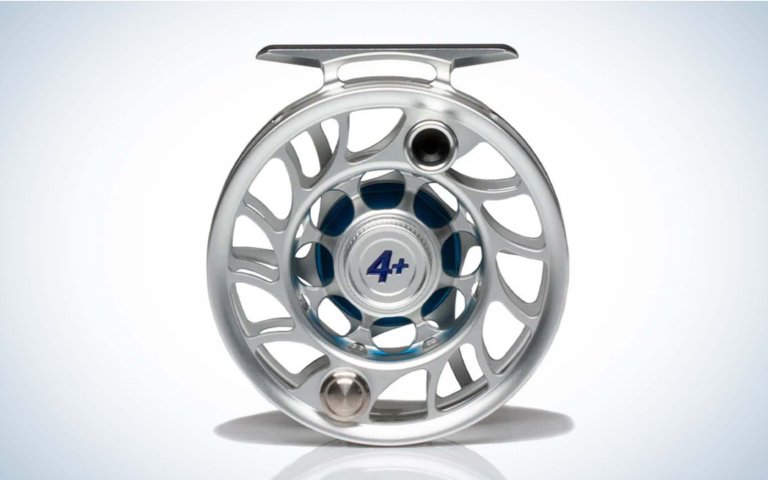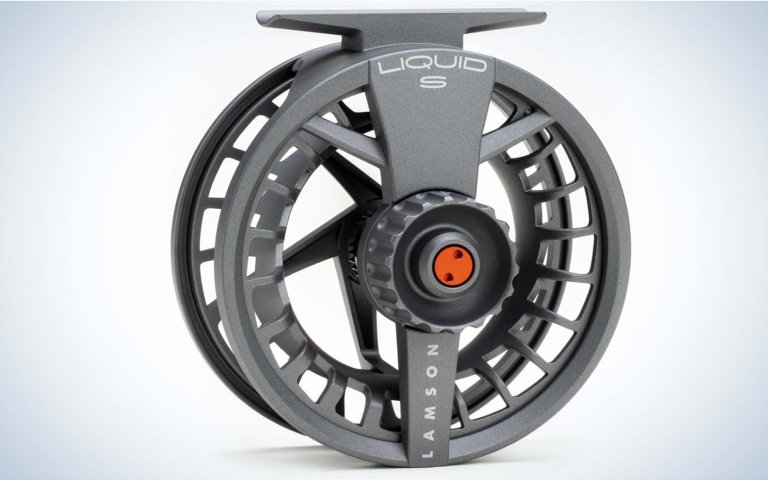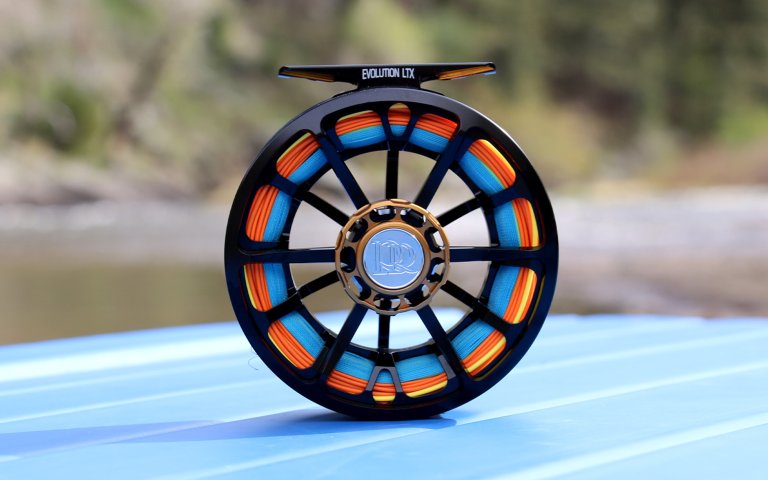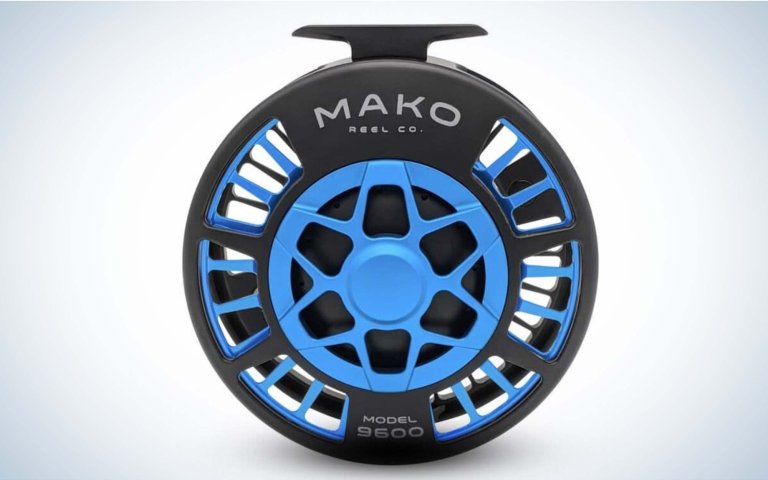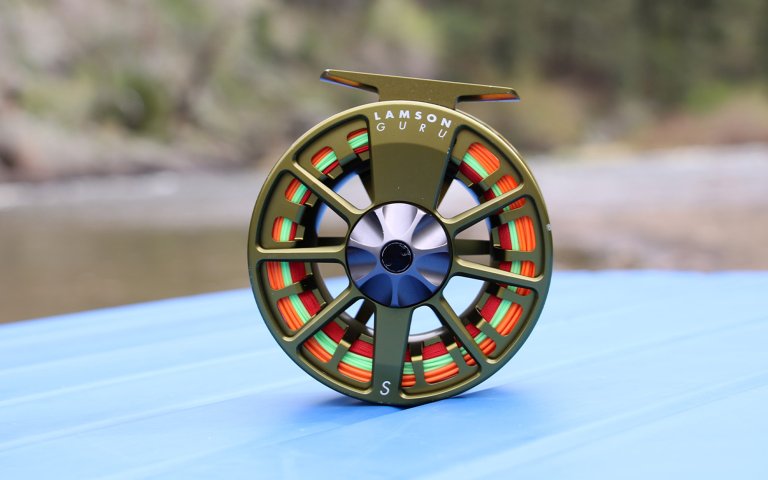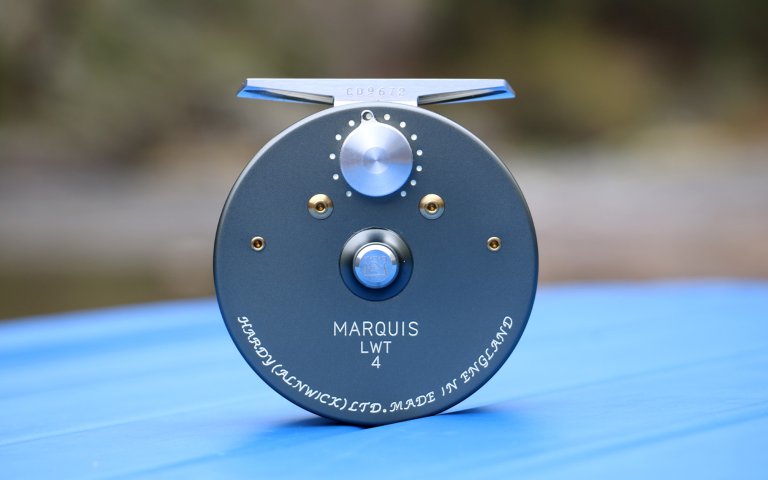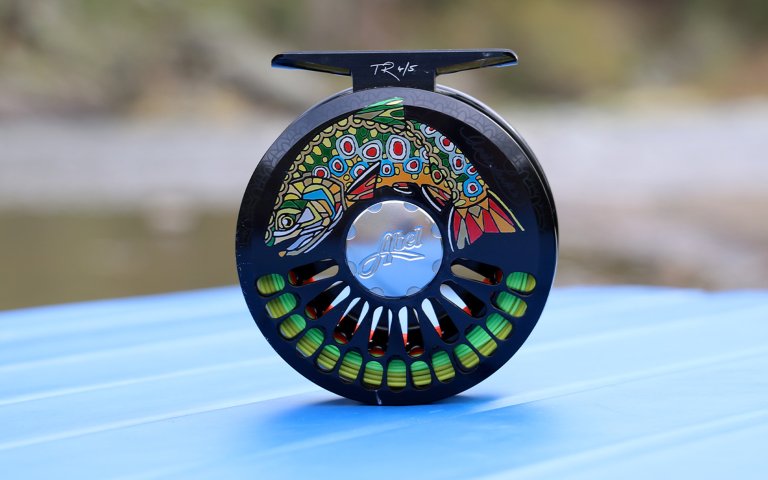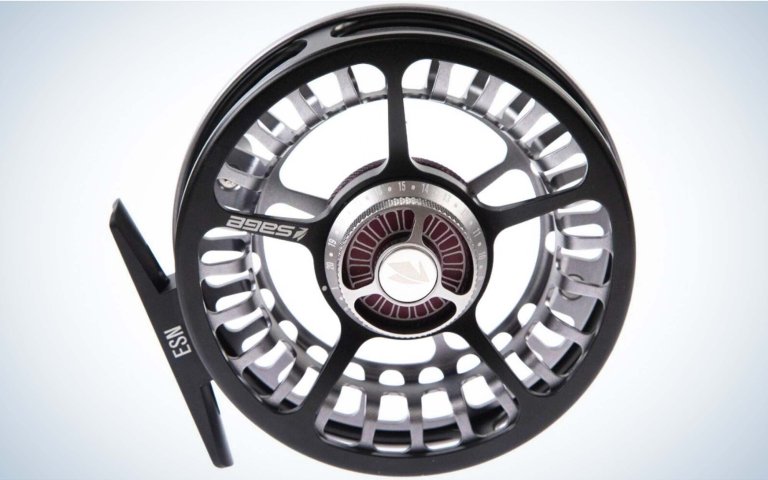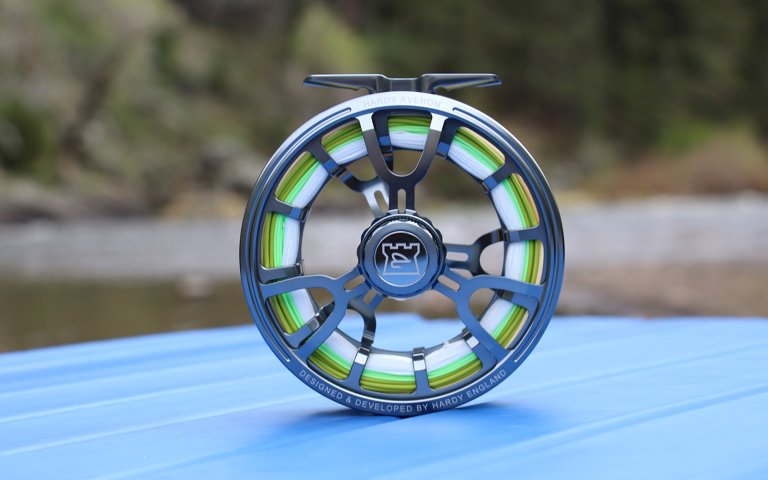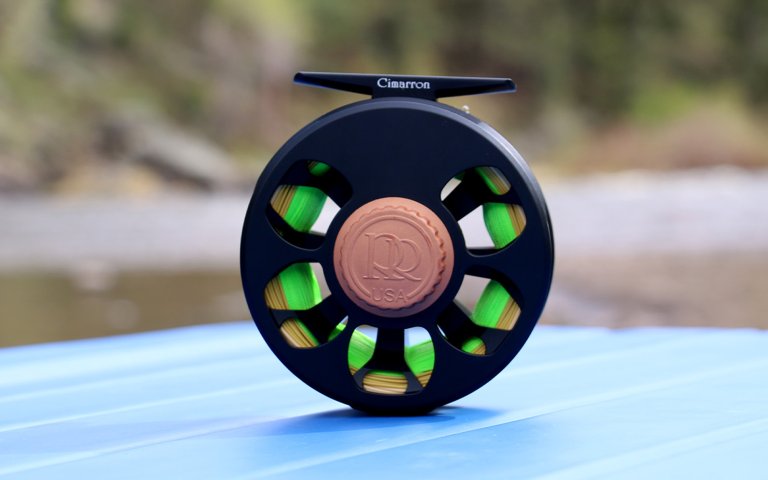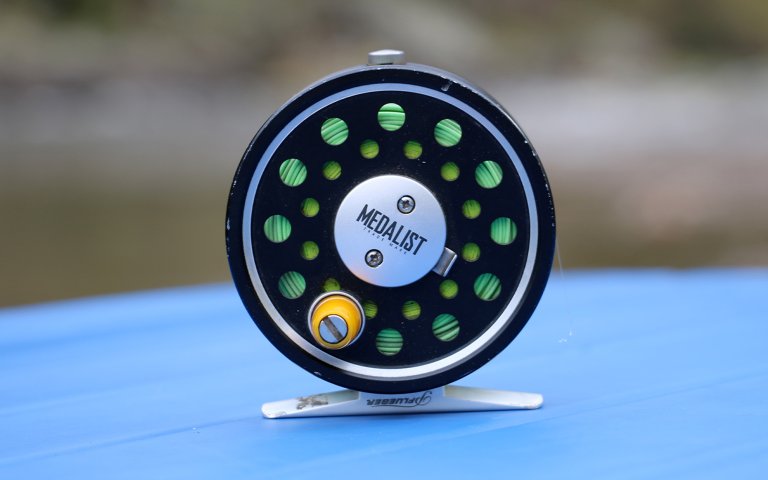We may earn revenue from the products available on this page and participate in affiliate programs. Learn More ›
Fly reels used to play second fiddle to rods, at least in the fly-fishing world. Volumes have been written about the nuances of bamboo, fiberglass, and graphite fly rods. But the reel? “It’s just a tool to hold your line,” was the prevailing adage among many anglers. You don’t hear that as much nowadays.
“As I evolved as a fly fisherman — branching out into saltwater and fishing for bigger trout and bass — it became readily apparent that the old dogma was just plain wrong,” author, reel tester, and Outdoor Life contributor Monte Burke says about the old ways of thinking about fly reels.
While it’s true that they play no role in casting (as conventional reels do), the best fly reels serve a number of other important purposes. To Burke’s point, this is especially true when you step outside the trout stream and start chasing bigger fish. In these and most other modern fly-fishing scenarios, a durable reel with a dependable drag can make all the difference.
Other qualities, like a reel’s weight, design, and aesthetics — how the reel looks and sounds — are important to consider. And because there are so many different options to choose from, I’ve selected 11 of the top fly reels, with the help of Burke, to get you pointed in the right direction.
- Best Overall: Hatch Iconic
- Best Budget: Lamson Liquid S
- Best for Trout: Ross Evolution LTX
- Best Reel for Saltwater and Big-Game: Mako 9600B
- Best Workhorse: Lamson Guru S
- Best Old-School: Hardy Marquis LWT
- Best Modern Click-and-Pawl Reel: Abel TR
- Best for Euro-Nymphing: Sage ESN
- Hardy Averon
- Ross Cimarron
- Pflueger Medalist
How We Chose the Best Fly Reels

The fly reels in this lineup have been used and tested extensively by OL editors and contributors. The list runs the gamut, from lightweight reels suited to small trout and panfish to large-arbor reels made for tarpon and other big-game species. Although a few are applicable for heavy-duty saltwater use, the following list leans more toward freshwater. (Check out our best saltwater fly reels buying guide if you’re shopping specifically for saltwater reels.) We stuck with well-known manufacturers, most of them based in the U.S., that have a reputation for quality.
The materials, internal components, and finishes will differ from reel to reel. Some are more suited to specific uses or water types, and we note this information in the descriptions. We’ve also included options at different price points, from budget picks to high-end, customizable reels. All of these fly reels will keep spinning for decades with the proper care, and some will last a lifetime or longer.
Best Fly Reels: Reviews and Recommendations
Best Overall: Hatch Iconic
Pros
- Top scores for toughness and durability
- Smooth drag designed for big fish
Cons
- Heavier and pricier than most other reels in its class
- Could be overkill for some anglers
Key Features
- Carbon-fiber drag system
- Machined from type II anodized aluminum
- Made in the USA
- Comes with a limited lifetime warranty
- Sizes: 3+, 4+, 5+, 7+, 9+, and 11+
- Mid or large arbor
- Price: $591 to $1,068
Hatch Outdoors has only been on the scene for about 20 years. But in that relatively short span of time, the California-based reel manufacturer has become ubiquitous in fly shops and guide boats around the world. Hatch reels have some of the smoothest and strongest drags around, and the reels themselves are damn-near indestructible. Because of these attributes, and especially the Yeti-like reputation they have for durability, Hatch is arguably the most popular high-end reel maker on the market today.
Unlike most other manufacturers, Hatch currently offers just one model: the Iconic. It is offered in a wide range of sizes, from the 3 plus, designed for 3-5 weight rods, to the 11 plus for 11-12 weight rods. Hatch also gives the option of a large arbor or mid-sized arbor when you get into the larger sizes. (The mid-sized arbor holds more backing for handling longer runs.) Unless you go the custom route (expect to pay for it), the Iconic is offered in four basic color patterns.
Building on the popular Finatic line, the Iconic has some subtle but noticeable improvements over its predecessor, including a lighter overall weight, better sealing, and a new carbon-filled drag that is strong enough to put the brakes on pretty much anything that swims. Is that overkill for most anglers? Absolutely. But if you’re looking for a fly reel that is tough as nails and smooth as silk, the Iconic is worth a close look.
Best Budget: Lamson Liquid S
Pros
- Solid drag system, but not as robust as the Lamson Guru ($300) and others
- Great value
Cons
- Finish can get scratched
- Not ideal for saltwater
Key Features
- Price: $140
- Made from die-cast aluminum
- Made in the U.S. with parts from both U.S. and overseas
- Comes with a limited lifetime warranty
- Sealed drag
- Sizes: 2/3/4, 4/5/6, 6/7/8, and 8/9/10
I bought my first Lamson Liquid reel many years ago as a backup for my salmon-fishing outfit. Over the years, I’ve found myself using it almost as much as I do the first team reel. The Liquid, which comes in 3-through-9-weights, is die-cast and not machined like most high-end reels, which is why the price is so low (it’s cheaper to manufacture that way).
But you don’t lose much in performance here, or even in durability, though I have found that the reel is easily nicked-up cosmetically. The drag system is the same one that Lamson uses in some of its high-end reels, so nothing is compromised there. The only real drawback is that I’ve had trouble in the saltwater with this reel — machined bar stock reels tend to hold up better in that hostile environment. But for your freshwater needs? An excellent backup, or even primary, reel, especially for those new to the sport. — Monte Burke
Best for Trout: Ross Evolution LTX
Pros
- Strength-to-weight ratio among the best in its class
- Has design features that help with playing fish
Cons
- Large arbor can be difficult to size on some rods
Key Features
- Made in the USA
- Comes with a limited lifetime warranty
- Sealed Drag System
- 6061 T6 Aluminum
- Reel Sizes: 3/4, 4/5. 5/6, and 7/8
- Price: $475
The Ross Evolution LTX is intricately machined, and its clean, thin lines prove a strange rule-of-thumb when buying higher-end fly reels: You typically pay more for less material. The strength-to-weight ratio of the spoked wheel design is what sets this reel apart. The LTX is a large-arbor reel that runs a bit bigger than some others in its class, and it has some unique features that add to its overall fishability.
The Evolution LTX can pull double duty in saltwater, but Ross makes an Evolution R Salt with a better sealed drag for regular saltwater use. I’ve been using the LTX on trout rivers and lakes in Colorado and Wyoming, where I tend to cast a lot and welcome a lighter reel. I’ve never hooked a fish the LTX can’t handle, and the more I use it, the more I’ve come to appreciate the reel’s finer points. I like the way it sounds, and I like the oversized drag knob, which is easier to adjust mid-fight than some others I’ve used. I even like the weird-looking “phenolic” handle, which Ross designed specifically to be grippier with wet fingers.
Read Next: Best Trout Fly Rods
Best for Saltwater and Big-Game: Mako 9600B
Pros
- Smooth Drag
- A drag lock, which means you’ll always know how much pressure you’re applying on a fish
Cons
- Heavy for its category
Key Features
- Made in USA
- Limited lifetime warranty
- Machined from type III anodized aluminum
- 15.23 ounces
- Fully sealed
- One-turn stop drag knob
- Price: $1,865
Mako was originally founded by an aerospace engineer named Jack Charlton, a true pioneer in the fly reel world. The reel is made to last a few lifetimes. Its carbon-fiber drag system is a giant upgrade over the cork drags that are found in many reels — it’s smoother and sturdier. And the reel’s interior parts are completely sealed, so it needs only a quick rinse even after getting dunked in the saltwater.
The Mako is the preferred reel of some of the top tarpon anglers of today, like Nathaniel Linville and David Magnum, prized for its toughness, reliability and ability to fight big, hard-charging fish. The drag lock allows the angler to fight fish with confidence: Any given setting always exerts the same amount of drag pressure. The only drawback (besides its hefty price tag) is weight: The Mako is heavier by a few ounces than other reels in its category. — Monte Burke
Best Workhorse: Lamson Guru S
Pros
- Hits the sweet spot between affordability and durability
- Sealed drag system requires very little maintenance
Cons
- Handle and drag knob are a bit smaller than some of other other reels
Key Features
- Sealed conical drag system
- Machined from bar stock 6061 aluminum
- Made in the USA
- Comes with a limited lifetime warranty
- Price: $300-$370
The Lamson Guru became one of my go-to reels after several seasons guiding fly fishermen in Alaska. (Along with the Konic, which is no longer made.) In my eyes, the Guru hits the Goldilocks zone between affordability and durability, and it has a quality drag system that’s more than enough for most anglers.
Like any good workhorse, the Guru is built to take a licking, and it’s an easy piece of gear to maintain. It has a sealed drag system, which keeps grit and sand out of the internal workings. And because of that, you can get away with fishing the Guru in saltwater — I’ve reeled in redfish in the Gulf — as long as you give it a good rinse with freshwater after each use. (I’d look elsewhere, though, if you need a daily driver for saltwater fishing.)
My only gripe about the older Gurus was that the spools would sometimes dent after a few drops and other abuse, causing them to rub uncomfortably against the reel frames. I could usually fix this with a pair of pliers. The new Guru S feels tougher and more dent-proof than its predecessor, and I don’t foresee this being an issue going forward.
The Guru has a nice outgoing sound and a muted incoming sound. I also like that the reel free spools when bringing line in, which allows you to “slap” a bunch of line back on to get a fish on the reel quickly.
Best Old-School: Hardy Marquis LWT
Pros
- Time-tested drag system
- Classic styling
- Makes a great outgoing and incoming sound
Cons
- Clicker drag isn’t ideal for fighting big fish, especially in a beginner’s hands
Key Features
- Click-and-pawl drag system
- Machined from bar stock 6061 aluminum
- Made in the USA
- Comes with a limited lifetime warranty
- Price: $375-495
There are a number of modern reels that have space-age components and a futuristic look about them. On the other end of the spectrum is the Hardy Marquis LWT, an elegantly simple reel made in the U.K.
A lighter-weight version of the classic Marquis, which was first released in the 1930s, the LWT incorporates a few small improvements. But functionally speaking, it is a re-modeled version of the same basic click-and-pawl reels that fly anglers have been using for over a century. It has classic styling, and like any good clicker reel, it sings like Sinatra.
The Marquis LWT is offered in several larger “Salmon” sizes in addition to the standard sizes that are better suited to trout anglers. I’ve found that it runs a bit smaller than some other reels in its class, and I like going up one size above Hardy’s recommendations. (If I was looking to put a Marquis LWT on a 5wt, for example, I’d opt for the 6 instead of the 5.)
Best Modern Click-and-Pawl Reel: Abel TR
Pros
- A gorgeous looking reel suited to most trout-fishing purposes
- Dependable drag with very few parts to go wrong
Cons
- Expensive for a clicker reel
Key Features
- Custom finishes make for a functional piece of art
- Machined aluminum with a stainless steel click-and-pawl drag system
- Made in the USA
- Comes with a limited lifetime warranty
- Price: $475
Another great option for the click-and-pawl crowd is the reintroduced Abel TR. The two letters stand for trout reel, and if you’re a trout angler (with a little money to spend) who likes the functionality of a click-and-pawl drag system in a sleek and modern package, the TR is your huckleberry.
The newer TR has a larger arbor than traditional clicker reels. And although the drag doesn’t do much to slow a fish down, it’s smooth enough to protect light tippets from breaking, and it makes a beautiful sound when it’s getting a workout. The reel also features a pronounced palming rim to help with playing fish, and with only 21 parts in total, it’s a simple piece of gear that requires minimal maintenance.
You can’t talk about the TR without touching on its looks, either. From the partial porting on the reel frame to the internal counterbalance and the Rosewood reel handle, every piece of the package adds to the overall aesthetics. This is true even for the parts you don’t normally see: Take the reel apart, and you’ll notice the milled silhouettes of aquatic insects inside the frame.
Abel is known for their custom finishes, which help protect the reels while turning them into functional pieces of artwork. (I’m partial to the fish prints by Derek DeYoung and Andrea Larko.) Even the basic black version, which starts at $475, is a stunner.
Best for Euro-Nymphing: Sage ESN
Pros
- A larger-than-usual arbor so you can get a fish on the reel as soon as possible
- A full frame so you won’t get your line or leader stuck in the reel
- Three weights included (.5 ounces, 1 ounce, and 1.5 ounces) so you can balance the reel to your rod
Cons
- A highly specialized, one-trick-pony reel
Key Features
- One size fits all
- Machined from 6061-T6 aluminum
- Carbon drag system
- Made in the USA
- Comes with a limited lifetime warranty
- Weight system for balancing on a rod
- Price: $450
European nymphing for trout has exploded in popularity in recent years, primarily because, when done right, it can be a deadly tactic for catching them. Part of doing it right is having the correct equipment, and the ESN is the best reel I’ve found for European nymphing. It has an extra-large arbor, which allows you to easily get the slack out of your line and get the fish on the reel quickly.
The full frame construction of the reel (basically, no gaps) is essential — your leader and the thinner lines used in the discipline can easily slip through any gaps in your reel and foul up your day. And the easy-to-install weights that come with the rod allow you to balance out your reel to your rod, whether you’re using a 2- ,3- ,4- , or 5-weight. Though the ESN should not be used for conventional fly fishing, it’s the only one you’ll need for European nymphing. — Monte Burke
Hardy Averon
Pros
- Lightweight and well balanced
- Has a smooth drag system
- Attractive finishes
Cons
- Drag isn’t completely sealed, so it’s limited to freshwater applications
- Comes in Euro-friendly models
- Machined from anodized aluminum
- Made in England
- Comes with a limited lifetime warranty
- Price: $395-475
The Averon is a newer offering from Hardy, and the centerpiece of the brand’s freshwater reel lineup. It took top honors at the 2024 iCast show, where it was named Best Fly Reel.
A lightweight and sharp-looking large-arbor reel, the Averon falls in the same category as the Ross Evolution LTX. It features the same intricate machining and is offered at a similar (but slightly lower) price point. Although I lean toward the Ross when comparing the two, one thing the Averon has over the LTX is specific models for the Euro-nymphing crowd. The full-cage version, the EuroNymph model, also includes interchangeable weights (just like Sage’s ESN) to help the reel balance on different rods.
Ross Cimarron
Pros
- Stout reel with a quality drag
- Entry-level price point
Cons
- Heavier than most
- Not a very attractive reel
Key Features
- A solid drag that isn’t sealed, but plenty strong for most freshwater applications
- Machined from 6061-T6 aluminum
- Made in the USA
- Comes with a limited lifetime warranty
The Cimarron is Ross’ entry-level reel. It features a similar drag system as the higher-end Animas, and the same limited lifetime warranty as Ross’ other reels. It is a stout reel with an anodized finish and a Cerakoted drag knob, both of which add to its durability.
The Cimarron isn’t the lightest or snazziest-looking reel. But I enjoyed using it on trout rivers, where it can bring fish to the net all day long. The drag is solid, and the oversized drag knob makes quick adjustments easy. Alongside the Guru, the Cimarron is another solid option for a budget-minded angler who wants a tough, dependable reel.
Pflueger Medalist
Pros
- Simple and affordable
- Plenty of reel for most beginners getting started in fresh water
Cons
- Click-and-pawl drag is better suited to small streams than bigger water
Key Features
- Machined from bar stock aluminum with an anodized coating for added durability
- Made in China
- Price: $130-$190
One of the most iconic and longest-lived fly reels on the market, the Pflueger Medalist has been a mainstay among American fly anglers for nearly 100 years. The newer, relaunched model features the same basic click-and-pawl drag system in an updated package. It has the same classic styling as the older versions, down to the unique, yellow handle.
For less than $150, the Medalist is an affordable option for a clicker reel, and it isn’t as fancy as the Marquis LWT or the Abel TR. Which, for many anglers, is a good thing. You can also find some used Medalists online for a penny and a song, and a lot of clicker-reel fanatics will tell you that the retro versions are superior to the newer reels, which are now made overseas.
How to Choose a Fly Reel
The following questions are helpful guidelines in choosing the right fly reel, and answering these is a good start when trying to narrow down your choices. From there, it really comes down to your personal preference and style, and how much you’re willing to spend.
Where Will You Fish and What For?
When choosing a fly reel, your first considerations should be the kinds of waters you fish and the species you’ll target. Saltwater anglers should stick to saltwater-rated reels, which are worth the extra cost due to the harsh conditions your reel will be subjected to. If you’ll spend most of your time on smaller trout streams catching stocker rainbows, you can get away with a basic, no frills reel and save your money for flies. If you like fishing bigger rivers and lakes for salmon, muskie, or other freshwater giants, it’s worth investing in a more durable reel with a stronger drag.
It helps to have a good idea of your budget as well. Expect to pay more for premium drag systems and lighter-weight reels, which require more expensive components and machining. Custom colors and high-end finishes come at a cost, too. But let’s face it, looks matter.
What About Sizing?
Your next key consideration is the size of the reel. If you’re looking to buy a reel for a specific rod, it should be pretty easy to settle on a size, as most reels are sized according to rod weight. This notation might differ from manufacturer to manufacturer. As examples, the Lamson Guru 5 Plus is recommended for 5- and 6-weight rods; so is the Ross Evolution LTX 5-6 and the Abel TR 5-6.
But this, too, comes down to personal choice in the end. To stick with the same examples, both the Evolution LTX and the TR are offered in 4-5 sizes as well, so the 5-weight angler will have to decide between the two options. To make things even more complicated, some reels run bigger or smaller than others in their class, while some anglers simply prefer a larger or smaller reel. (One term you might hear tossed around is the size of the “arbor,” and this simply refers to the diameter of the spool. Large arbors allow anglers to reel in more line with a single turn, and it seems like most manufacturers are trending toward larger arbors.)
The best, and really the only, way to settle on a size is to pick up a reel for yourself. Better yet, bring the rod you’re looking to pair the reel with and see how well it balances. The best way to to do this is by resting the fattest part of the rod grip on your index finger and seeing if the rod leans “tip heavy” or “butt heavy.” (Keep in mind that an empty reel will gain a slight bit of weight when you spool it with backing and fly line.) This balance game also comes down to personal preference, but it can be a helpful way to choose between different sizes.
What Kind of Drag Do You Need?


In terms of a reel’s functionality, the most important piece to consider is the drag system, which controls the tension on the line and the amount of force required to pull line off the spool. Most modern drag systems are known as disc drags, and they work similar to disc brakes in a car. In these systems, the “brakes” are friction discs, and they are typically made of cork, carbon, or another material like teflon. The drag knob allows anglers to easily adjust these discs in order to decrease or increase the tension.
Then there are click-and-pawl drags. Unlike the more modern disc-drag systems, click-and-pawl drags rely on a small metal piece (the pawl) that engages with the teeth of a gear inside the reel. This simple clicking mechanism slows down the outgoing line just enough to prevent the line from backlashing, and the only way for an angler to increase tension (and slow down a running fish) is by applying pressure to the spool with their palm.
For this reason, click-and-pawl reels are most commonly used by trout anglers, and they’re often associated with smaller fish on smaller streams. In the right hands, though, a clicker reel is more than capable of landing a hard-fighting salmon or steelhead, and some anglers actually prefer to fight fish this way. Another bonus of this simple design, when compared to disc drags, is that click-and-pawl reels feature fewer parts that can fail, and they require almost no maintenance.
With that said, I would always recommend a disc drag over a click-and-pawl drag to beginner fly fishermen, saltwater anglers, and anyone else who regularly chases bigger fish. Our above list reflects this advice, as most of them feature disc drags. Besides, if you like the hands-on experience of palming the reel during a fight, you can always adjust your disc drag to its lowest setting.
As a final consideration when shopping for a fly reel, pay attention to how the drag sounds. Although it might seem like an afterthought at first, you’ll be hearing that sound a lot as you constantly pull line off the reel and reel it back on while fishing — or maybe you won’t hear much of anything at all. Some reels are quiet, others are loud, and each makes its own music when a fish is running full-tilt in the other direction.
FAQs
No, and this is perhaps the biggest difference between fly reels and conventional reels. With a conventional reel, you can get between five and seven turns of the spool for every crank of the handle. But with a fly reel, each crank of the handle equals one turn of the spool. This means that fly reels offer less of a mechanical advantage than conventional reels when actually fighting a fish.
Yes. All the reels on this list have interchangeable spools that easily detach from the reel frame, and you can purchase spare spools separately. This allows you to swap out spools in order to use the same reel on different rods, or to change between different lines. As an example, maybe you’re a streamer fisherman and you want to be able to switch over from a standard floating line to an integrated sink-tip line. Having a spare spool gives you this versatility without having to carry two reels.
Backing is the thin line that fills the spool and serves as the “backup” to your fly line. A typical fly line is only 80 to 90 feet in length, which is longer than most intermediate anglers can cast. But a decent-sized fish, even a trout, can swim further than that in heavy current. And a bonefish will peel off 100 yards of line in no time.
This is where backing comes into play. Each reel is designed to hold a certain amount of backing in addition to the fly line — typically 100-150 yards, or more when you get into the larger reels. Creek fishermen and anglers targeting smaller fish might never see this thin line in action, but they should fill their spools with the appropriate amount of backing just in case.
A good fly reel should be able to withstand some abuse. It’ll be dropped in the river, on sandy beaches and sharp rocks, and it’ll be put away wet often. With a little bit of maintenance, though, you can help extend the life of your fly reel.
It’s always a good idea to rinse your reels with freshwater, and this becomes absolutely essential if your reel has been exposed to salt water. Corrosion will put a fly reel out of commission in no time. A lot of anglers will clean their lines once a year, too, which helps the line shoot better but also keeps dirt and grime out of the inner workings of the reel.
With disc drags, it’s recommended to let off the drag to the lowest setting when storing the reel for longer periods. Some older style disc drags, like those featuring cork discs, require a bit of oil or other lubrication from time to time. Click-and-pawl drags require minimal maintenance aside from basic cleaning and maybe adding a drop of grease to the gears every once in a while.
Final Thoughts on the Best Fly Reels
Fly reels are just as important as the rods, especially when targeting bigger fish. They’re also versatile pieces of gear, since they have interchangeable spools and can be used on different rods. But choosing the best fly reel doesn’t have to be overly complicated. By answering a few key questions about what you want in a reel, you can narrow down your selections pretty quickly. We’ve also provided 11 of our favorite fly reels at different price points to get you pointed in the right direction.
- Best Overall: Hatch Iconic
- Best Budget: Lamson Liquid S
- Best for Trout: Ross Evolution LTX
- Best Reel for Saltwater and Big-Game: Mako 9600B
- Best Workhorse: Lamson Guru S
- Best Old-School: Hardy Marquis LWT
- Best Modern Click-and-Pawl Reel: Abel TR
- Best for Euro-Nymphing: Sage ESN
- Hardy Averon
- Ross Cimarron
- Pflueger Medalist
